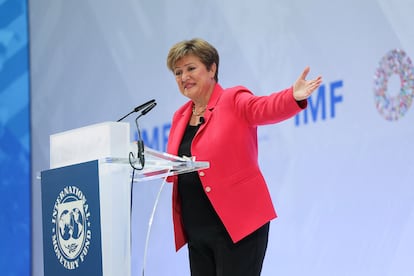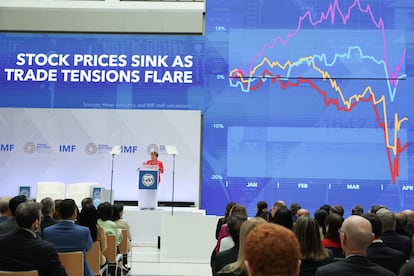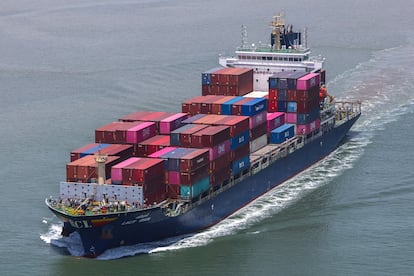Trump slows down the world economy: The IMF lowers its global growth forecast
The international organization notably scaled down its prediction for US growth and warned that ‘we are entering a new era’


“We are entering a new era as the global economic system that has operated for the last 80 years is being reset.” The phrase, uttered by Pierre-Olivier Gourinchas, chief economist of the International Monetary Fund (IMF), isn’t one you hear every day. The trade war declared by U.S. President Donald Trump against the entire world, with the highest tariffs in more than a century, represents a reversal of the post-World War II international economic order. For now, the uncertainty typical of cycle changes prevails, but one thing seems clear: Trump has slammed the brakes not only on the U.S. economy, but on the global economy as a whole.
For the global economy, the growth forecast for this year has dropped from 3.3% to 2.8%, and for 2026, from 3.3% to 3.0%, although any forecast for more than a year seems like science fiction against the current backdrop. The current growth prospect for the global economy is the weakest since the Covid pandemic and one of the lowest of the century, with the exceptions of the global recessions of 2009 and 2020 and the 2001 crisis following the bursting of the dotcom bubble.
Pessimism has taken hold of the IMF and World Bank Spring Meetings, which are being held this week in Washington. There is talk of slower growth, higher inflation, general uncertainty, market volatility, and a difficult-to-predict future. Events are moving so fast that forecasts are outdated before they are published.

The IMF had to throw away its forecasts when Trump showed up in the White House Rose Garden on April 2 with his tariff chart. Its economists had to complete a new analysis cycle in just 10 days, a job that usually takes more than two months. What’s worse, its calculations have become outdated again. The baseline forecasts published this Tuesday in its World Economic Outlook report are based on tariff developments through April 4, excluding the partial pause on the so-called “reciprocal tariffs,” the escalation of the trade war between the United States and China, and a few other twists and turns. The Fund has developed alternative scenarios, but even these exclude the most recent events.
Although IMF Managing Director Kristalina Georgieva had already announced that the new forecasts do not predict a global recession, the report gives such a scenario a 37% probability. There are, however, substantial and widespread downgrades in growth prospects. They affect all major economies, both advanced and developing, with one notable exception: Spain, for which the Fund predicts a more dynamic economy, which would make it the country with the highest growth among all major advanced economies.
No other major economy is spared the fire. For the United States, the cut is 0.9 percentage points this year, down to 1.8% growth, and 0.3 percentage points next year, to 2.0%. The country that will be suffering the most is Mexico, which is condemned to a recession by the trade war, with a contraction of 0.3% this year after a 1.7-point cut in forecasts. China and Canada, the United States’ other two major trading partners, have had their growth forecasts cut 0.6 points this year, to 4.0% and 1.4%, respectively.
The reduction is 0.2 percentage points for both the eurozone and the European Union, down to 0.8% and 1.2% growth respectively, with a stagnant German economy. Forecasts for Japan and the United Kingdom worsened by half a percentage point, to expected growth of 0.6% and 1.2%. Brazil, India, Indonesia, Australia, Saudi Arabia, Nigeria, and the world’s 20 largest economies are all suffering cuts to varying degrees.
This isn’t simply a downgrade of forecasts. It’s a major shakeup, a change of era, said Gourinchas. “Existing rules are challenged while new ones are yet to emerge. Since late January, a flurry of tariff announcements by the United States, which started with Canada, China, Mexico and critical sectors, culminated with near universal levies on April 2. The U.S. effective tariff rate surged past levels reached during the Great Depression while counter-responses from major trading partners significantly pushed up the global rate,” he added.
The IMF noted that, unlike in the 20th century, the global economy is now characterized by a high degree of economic integration, with supply chains and financial flows crisscrossing the globe, the potential disintegration of which could constitute a major source of economic disruption. “If sustained, this abrupt increase in tariffs and attendant uncertainty will significantly slow global growth,” said Gourinchas.
Uncertainty and unpredictability
The Fund warns that, beyond this scenario, there are many possibilities, but that the uncertainty itself hinders growth. Faced with increased uncertainty about market access — both their own and those of their suppliers and customers — many companies’ initial reaction will be to pause, reduce investment, and cut back on purchases, the IMF forecasts. Similarly, financial institutions will reevaluate their credit offerings to companies until they can assess their exposure to the new environment.
Furthermore, the unpredictability with which these measures have been implemented also has a negative impact on economic activity and prospects and, at the same time, makes it more difficult than usual to formulate hypotheses that serve as the basis for a set of coherent and timely projections, said the Fund.

Weakening demand has driven down oil prices, while the effect on the exchange rate is more difficult to analyze. In previous episodes, tariffs have led to an appreciation of the dollar, but this time uncertainty, the prospects for slower growth in the United States, and lower demand for U.S. assets are weighing on the dollar.
The IMF is calling for more predictability and stability in trade policy, with a rules-based system, which is precisely what Trump has blown up. It also admits that central banks face a dilemma between containing prices and sustaining demand. It asks them to be vigilant about the risk of a resurgence of inflation expectations and warns about the importance of maintaining central bank independence — in what appears to be another message to Trump following his attacks on Federal Reserve Chairman Jerome Powell.
Sign up for our weekly newsletter to get more English-language news coverage from EL PAÍS USA Edition
Tu suscripción se está usando en otro dispositivo
¿Quieres añadir otro usuario a tu suscripción?
Si continúas leyendo en este dispositivo, no se podrá leer en el otro.
FlechaTu suscripción se está usando en otro dispositivo y solo puedes acceder a EL PAÍS desde un dispositivo a la vez.
Si quieres compartir tu cuenta, cambia tu suscripción a la modalidad Premium, así podrás añadir otro usuario. Cada uno accederá con su propia cuenta de email, lo que os permitirá personalizar vuestra experiencia en EL PAÍS.
¿Tienes una suscripción de empresa? Accede aquí para contratar más cuentas.
En el caso de no saber quién está usando tu cuenta, te recomendamos cambiar tu contraseña aquí.
Si decides continuar compartiendo tu cuenta, este mensaje se mostrará en tu dispositivo y en el de la otra persona que está usando tu cuenta de forma indefinida, afectando a tu experiencia de lectura. Puedes consultar aquí los términos y condiciones de la suscripción digital.








































